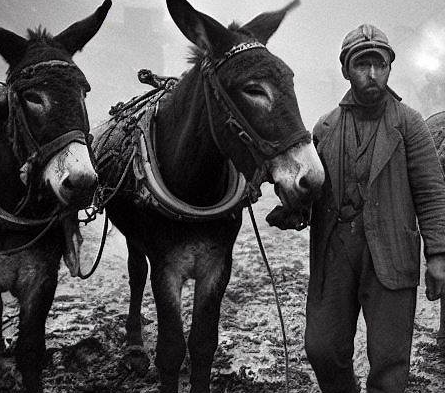By: Prof Sarwar Magsi
In the heart of Pakistan’s coal mines, a daily expedition unfolds, where both humans and donkeys undertake a hazardous journey. Plummeting thousands of feet into the earth, they toil relentlessly to extract coal, a precious resource fueling the nation’s economy. However, the stark truth is that the donkeys, indispensable in this perilous endeavor, face a tragically shortened lifespan compared to their counterparts in other sectors, shedding light on the high human and animal toll of coal mining in Pakistan.
Miners, dedicating 10 to 11 hours a day in the coal mines of Chakwal district, stress the crucial role of donkeys in this challenging work. These animals, vital for coal extraction, face grueling conditions that limit them to 10 to 12 rounds daily. The miners share stories of donkeys perishing or succumbing to injuries, illness, or weakness due to the perilous mine climbs.
Addressing the medical needs of these injured donkeys is a formidable task. While doctors provide treatments ranging from sprays, medicines, injections to drips, the challenging mountain routes make it nearly impossible to transport a sick donkey to a hospital, highlighting the urgent need for improved medical facilities in these mines.
Feeding donkeys in the coal mines is an expensive affair, primarily relying on specific feeds. With meager daily earnings barely sufficient for survival amidst rampant inflation, the financial burden on miners underscores the need for industry support and regulation.
The discontent among miners extends to the lack of facilities within the coal mines. The absence of official accommodation, beds, or medical facilities places the entire burden on the workers, emphasizing the need for industry and government support to enhance working conditions.
Another miner underscores the critical role donkeys play in operations, revealing their maximum working lifespan of only two years in these harsh conditions. When these animals are absent, workers face wage loss. The miners express dissatisfaction with the minimal medical assistance provided, emphasizing the urgent need for better healthcare facilities for both workers and donkeys in the mines.
Returning home every two and a half to three months, miners endure separation from their families. This isolation underscores the necessity for improved living conditions and support for these coal miners working in remote areas.
Dr Rab Nawaz, a community animal health officer, sheds light on the harsh reality faced by donkeys in the coal mines, starting work at a young age and serving for a considerably shorter lifespan compared to their counterparts in other industries. The reliance on ineffective home remedies emphasizes the need for education and support to enhance veterinary care in these remote, mountainous regions. The call for industry-wide change becomes apparent to improve the welfare of both humans and animals involved in coal mining.

